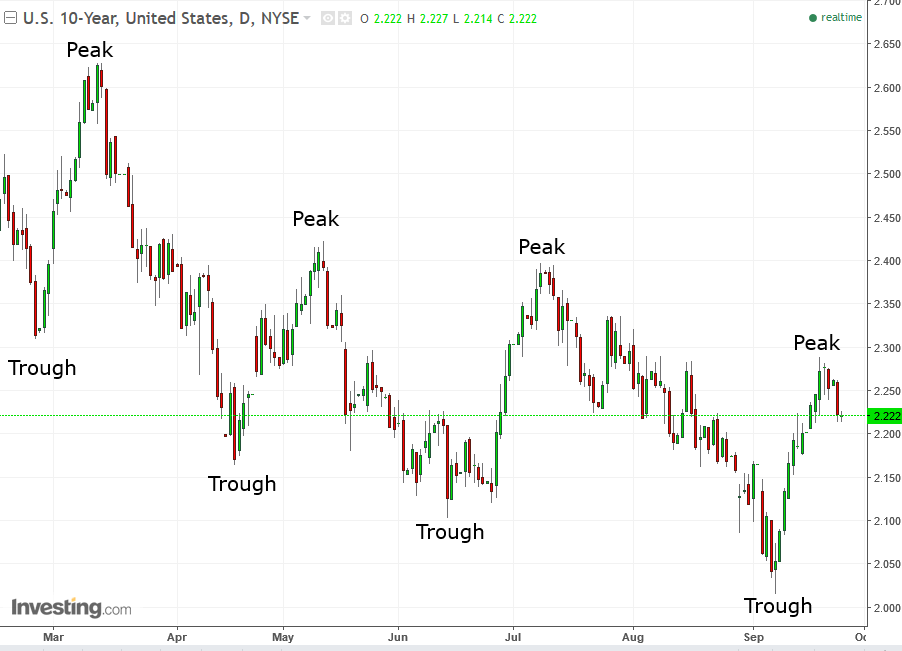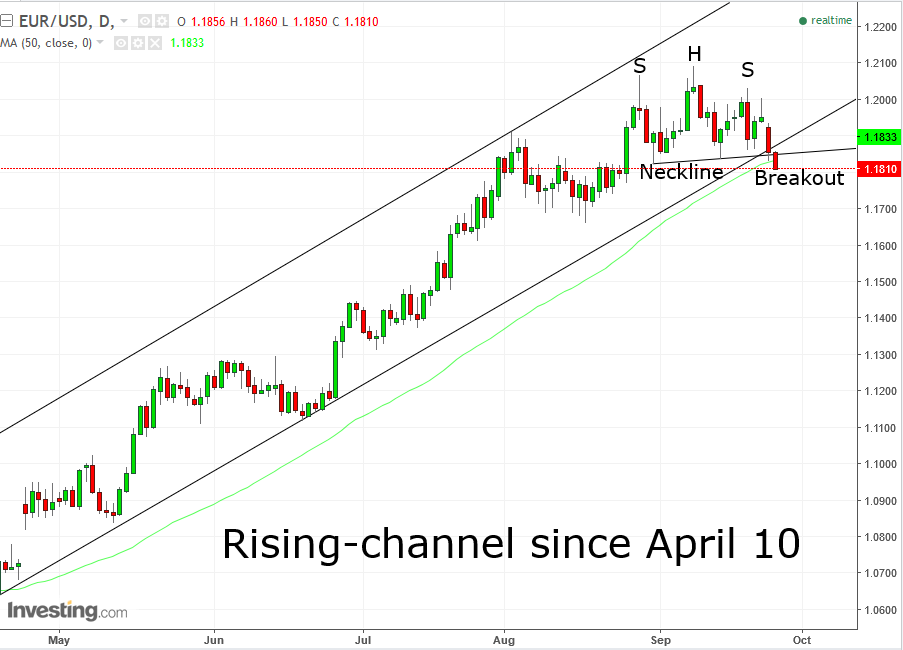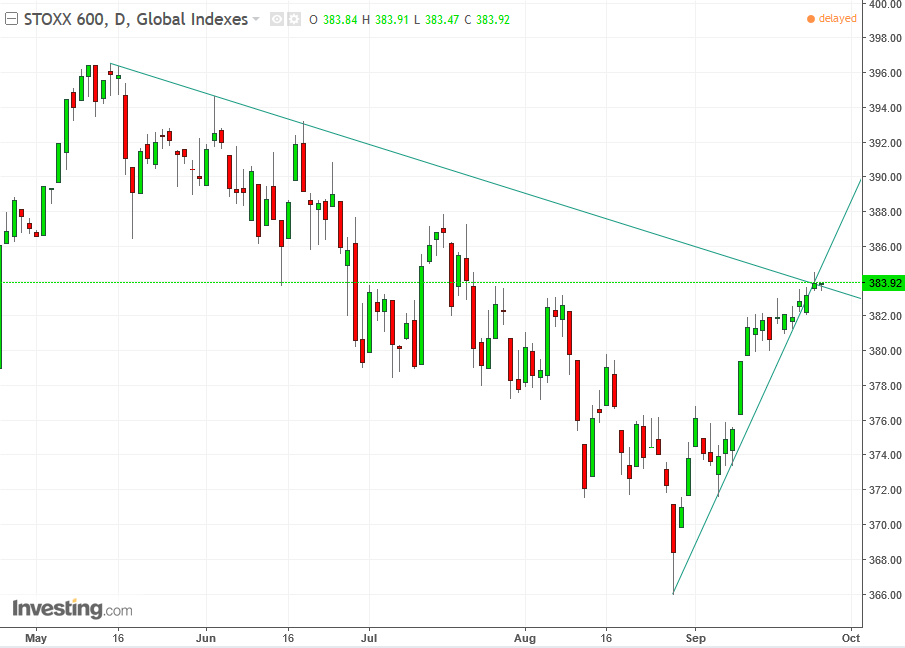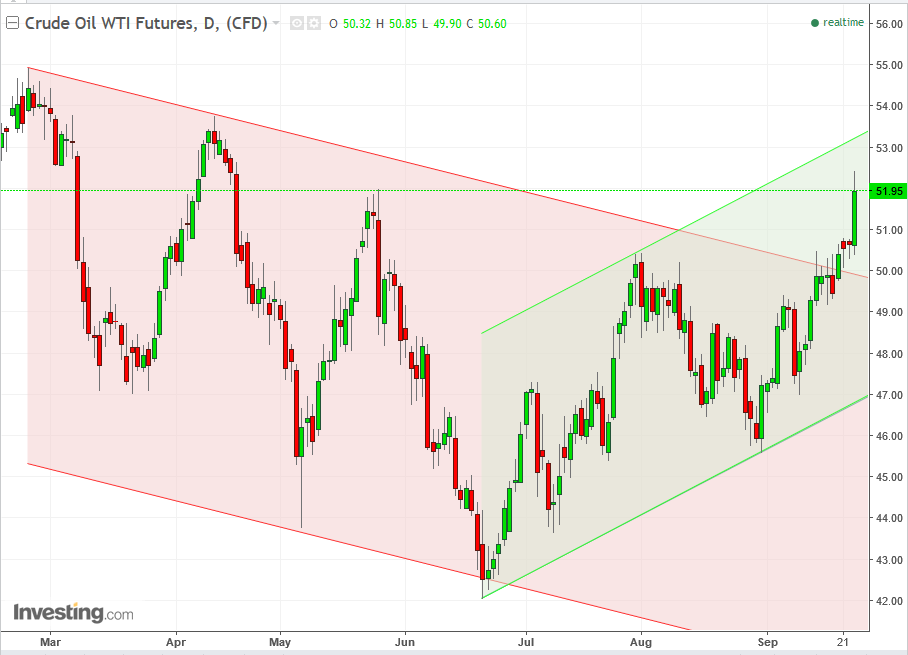Investing.com’s stocks of the week
by Pinchas Cohen
Key Events
- North Korea says US talk, “declaration of war”
- Cross-market risk-off sentiment takes hold, perhaps first time this year
- Fed argues whether low inflation is temporary
- Merkel coalition struggle bad for euro, good for stocks
- Oil reaches 5-month high, on threat of Turkish supply disruption
North Korea Tensions Mount
The war drums are sounding louder, as bellicose rhetoric appears to be catching fire on both sides of the Pacific. While the world is used to a certain amount of sabre rattling from North Korea, it's unusual to hear it coming from the US.
The ongoing Kim Jong Un vs Donald Trump chest-thumping has taken on something of a prissy, he-said-no-he-said dynamic. The isolated Asian country’s foreign minister, Ri Yong Ho, speaking last night in New York, asserted that US President Trump had declared war on North Korea and therefore the rogue Asian state has the right to shoot down US jets – a statement that in and of itself might be considered a declaration of war by most countries. The White House, naturally, denies this allegation.
While North Korea has claimed in the past that the US declared war on Pyongyang, the fact that US warplanes deliberately flew near North Korea's coastline this past Saturday, along with South Korea stepping up its live-fire tests, renders the potential for a possible conflagration more viable. A mistake in the field by a commander – on either side – could turn a small incident into something much more serious. Even China’s ambassador to the UN told Reuters the situation is “getting too dangerous.”
Global Financial Affairs
For perhaps the first time this year, all market players appear to be in agreement as cross-market, risk-off sentiment takes hold. High-growth, high-risk assets such as metals and stocks led by the technology sector have sold off, as Treasury yields declined. G-10 currencies, except for the traditional havens the yen and Swissy, have also slipped.
Declines among Asian stocks remained muted this morning, as investors relied on the US's continued efforts in pursuit of denuclearization through diplomatic channels. Markets participants continue to remain steadfast in their focus on upcoming comments from central bank policy makers, as they continue to try and drown out the noise from back-and-forth “He started it!” NK-US rhetoric.
Investors will attempt to listen to the Fed’s soft argument on whether to raise US interest rates again this year – as Dudley sees low inflation as temporary and the Fed should therefore stay on its interest-rate track, while Evens is concern it reflects structural forces and the Fed should therefore put hikes on hold- as they attempt to turn a deaf ear to the cacophonous argument of who said what about a nuclear war. Traders are betting on a 60-percent chance on an interest rate increase in December, to follow the March and June hikes.

Like the yen, which rises on its safe haven status, Treasuries are rising, pushing down yields, on the rising chatter from North Korea. Yesterday’s 1.7-percent decline suggested the forming of the September 20, 2.289 high into a peak. This resumes the downtrend since March, in which both peaks and troughs continued to register at lower prices.

The euro is taking another hit today from Germany's Chancellor Angela Merkel’s dismal victory, which leaves her 20-percent weaker and scrambling to form a coalition in a disadvantageous environment, where the far-right party is now the country's third largest party.
The euro crossed below a triple support: its rising channel since April 10, the 50 dma and the neckline of a small H&S. Should the price remain below these supports, the single currency will probably retest the 1.1700, August trough. Should that price level break, the euro would have completed a reversal, whose downtrend would be plagued by volatility according to unexpected German coalition events, reports and rumors.
The bright side for German assets—similar to what Japan is experiencing as discussed here yesterday—is that a weaker euro supports European equity prices, as it makes exports competitive once again. As well, eurozone stocks become cheaper for foreign investors.

The STOXX 600 Index has been rising against the falling euro, reaching the intersection between its downtrend line since May 15 and uptrend line since August 29, in what can be described as a bull-bear standoff, where each is saying: 'You have the next move.'

The price of WTI crude oil reached its highest since April 19, after Turkey threatened to shut down Kurdish crude shipments through its territory on the heels of the Kurdistan independence referendum yesterday. In addition, signs in September to point to the efficacy of OPEC / non OPEC production cuts, which could continue.
The commodity's price rose more than 3-percent since the previous, August peak, satisfying even the conservative filter in avoiding a bull-trap. However, it is finding resistance at the May 25, $52 peak, paring gains from a $52.43 high, in which it reached 1.3-percent below its rising channel-top, since June 21, making a correction to the channel bottom possible, or at-least to the round-psychological $50 key-level.
Up Ahead
- The roster of Central Bank speakers continues. Markets will be watching a speech by the Fed’s Yellen later today. Bank of England Governor Mark Carney will speak on Thursday, as will soon-to-depart Fed Vice Chairman Stanley Fischer.
- U.S. data on new home sales will be released Tuesday; durable goods orders on Wednesday; GDP and personal spending later in the week will all provide additional clues to the Fed’s policy path.
- Brexit negotiations are getting underway again.
- Spanish Prime Minister Mariano Rajoy will meet U.S. President Donald Trump in Washington on Tuesday, while his team back in Madrid attempts to turn the screws on a secessionist push in Catalonia.
- The euro-area inflation rate may have accelerated a touch to 1.6 percent in September from 1.5 percent but the core will probably remain at 1.2 percent when data is out on Friday.
Market Moves
Stocks
- Japan’s TOPIX closed flat after trading within a narrow range.
- South Korea’s KOSPI fell 0.3 percent and Australia’s S&P/ASX 200 Index lost 0.2 percent.
- Hong Kong’s Hang Seng Index added 0.1 percent after slumping 1.4 percent on Monday as Chinese property developers tumbled on fresh mainland efforts to curb home prices.
- The Stoxx Europe 600 Index gained less than 0.05 percent as of 9:02 a.m. London time.
- The MSCI All-Country World Index dipped 0.2 percent to its lowest in more than two weeks.
- The FTSE 100 declined 0.2 percent, the largest drop for the UK index in more than a week.
- Germany’s DAX fell less than 0.05 percent.
- The MSCI Emerging Markets Index sank 0.5 percent to its lowest point in four weeks.
- S&P 500 Futures decreased 0.1 percent to their lowest in more than a week.
Currencies
- The Dollar Index increased 0.25 percent, the highest point for the index since September 1.
- The euro dipped 0.3 percent to $1.1814, the weakest in more than a month.
- The British pound advanced 0.1 percent to $1.3481.
Commodities
- Gold declined 0.4 percent to $1,305.60 an ounce.
- West Texas Intermediate crude fell 0.4 percent to $52.00 a barrel, the largest fall in a week.
Bonds
